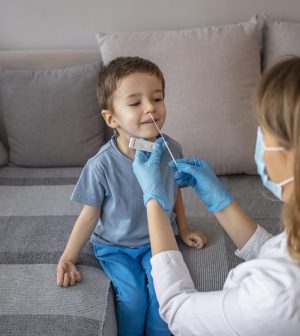- Could Your Grocery Store Meat Be Causing Recurring UTIs?
- Are You Making This Expensive Thermostat Error This Winter?
- Recognizing the Signs of Hypothyroidism
- 10 Strategies to Overcome Insomnia
- Could Artificial Sweeteners Be Aging the Brain Faster?
- Techniques for Soothing Your Nervous System
- Does the Water in Your House Smell Funny? Here’s Why
- Can a Daily Dose of Apple Cider Vinegar Actually Aid Weight Loss?
- 6 Health Beverages That Can Actually Spike Your Blood Sugar
- Treatment Options for Social Anxiety Disorder
Simple Nose Swab Test Might Gauge Severity of Child’s RSV

While it isn’t possible to tell parents how long their child will need to remain in intensive care with a serious case of RSV, new research has unearthed clues that may make it easier to predict which kids will require a longer stay.
To study the issue, researchers from the Ann & Robert H. Lurie Children’s Hospital of Chicago used nose swabs from children with RSV in the pediatric intensive care unit (PICU) within a few days after hospital admission.
The team examined what genes turn on in response to RSV, also called respiratory syncytial virus.
Despite the same quantity of RSV and the same clinical presentation, some children showed signs of greater damage to the cells lining the inside of the nostrils. This, researchers found, correlated to longer PICU stays.
“We were excited to find that the severity of a child’s illness related to the different sets of genes turned on in their body’s response to RSV,” said senior study author Dr. Bria Coates, a critical care physician at Lurie Children’s. “The ability to identify which infants with RSV in intensive care will recover quickly and which patients will require a longer stay would provide invaluable information to parents and medical providers.”
While exciting, these findings will need to be validated in a larger group of children before they can be used clinically, Coates noted.
“At this stage, we saw that more injury in the nasal mucosal membranes of children with RSV may be a marker of a dysregulated response to the virus and predict more prolonged illness,” Coates said in a hospital news release. “These are promising findings that ultimately might offer better answers to parents and the care team.”
The findings were published recently in the journal Frontiers in Immunology.
More information
The U.S. Centers for Disease Control and Prevention has more on RSV.
SOURCE: Ann & Robert H. Lurie Children’s Hospital of Chicago, news release, Nov. 2, 2022
Source: HealthDay
Copyright © 2026 HealthDay. All rights reserved.










